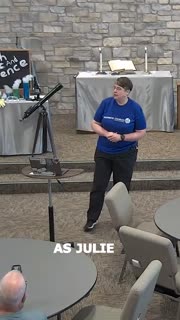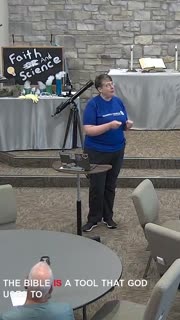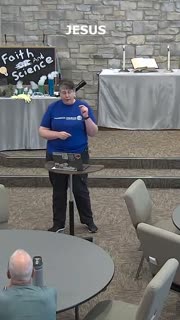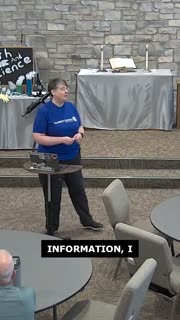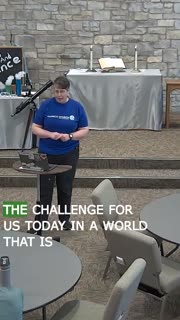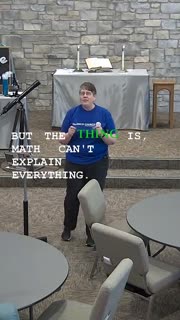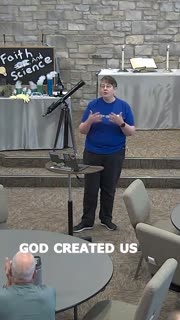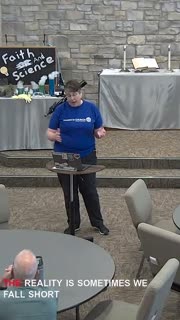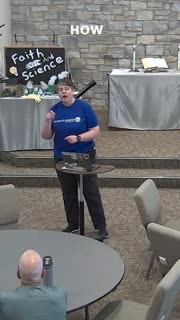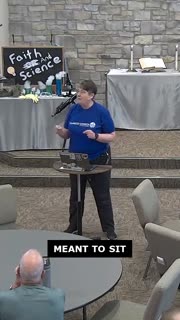Listening to God's Voice in a Noisy World
Devotional
Sermon Summary
Bible Study Guide
Sermon Clips
1. "As Julie pointed out at the beginning of worship, there's a number of us that feel like we are drowning in information these days. It seems like everyone has more and more content that they want to share with us. I was laughing at one of the interviews that I saw between an older gentleman at a certain political convention recently who was trying to convince a 12-year-old of this older gentleman's idea of how the world was operating. And the 12-year-old was remarkably educated on what was going on in the world and really put this older gentleman in his place." [19:32] (38 seconds)
2. "The Bible is a tool that God uses to communicate with us. It is a tool that has gone through many editors. Many people have been involved. This wasn't just one person writing down what one person thought God may or may not be saying. This was a whole community of people over a long period of time. And as a community, they were connected to God and they were connected to each other." [21:37] (27 seconds)
3. "Jesus changes lives. Jesus brings hope. Jesus brings healing. The question for us now is what are we doing with the Jesus information ourselves? Do we come to church for an hour on Sunday morning and we feel good listening to the Psalm and hearing the Gospel and saying, Jesus loves me. This I know. And then we go out and we eat brunch. We drink our coffee. We have some good snacks in the fellowship hall. And then we come back next week." [35:14] (32 seconds)
4. "Jesus gave the information, I save you because I love you. When you say yes to me, you are saved. But then Jesus says, but then I want you to pick up a cross and I want you to follow me. I want you to do what I am doing. I want you to heal people. I want you to comfort people. I want you to address injustice in the world. Take the information I am giving you and put it into work." [37:16] (28 seconds)
5. "The challenge for us today in a world that is swimming in information is for us to create using the information that Jesus has given us. The message of Jesus. Use Jesus' information to heal and comfort people. Use Jesus' information to care for creation. Use Jesus' information to make changes that make life better for our neighbors." [38:26] (25 seconds)
6. "But the thing is, math can't explain everything. And when it comes to information, math can't tell us what the most useful information is. We see this all the time. The algorithms fail us. And the simplest way to see this is that we might get together, and you go over to someone's house, and they may talk for half an hour about their shopping trip to get the food for that evening's dinner. Half an hour. How many words get shared in half an hour? But the next day, that conversation doesn't change your life. But you might have a conversation with just two or three words that changes your life forever. Those two words might be, I'm pregnant. Three words might be, I love you." [29:12] (52 seconds)
7. "God created us to be sharing information with each other, to be living life together in community and in relationship. So when we think about how God communicated with us, we see in the Bible it started with him talking to Adam and Eve and walking in the garden. God created a relationship with Abraham where he moved to a new country and started a new family. God talked to Moses. God talked to Ruth. God talked to Mary. Jesus came and shared all sorts of new information trying to clarify how it is that God wants us to know God and to live with God." [31:45] (44 seconds)
8. "The reality is sometimes we fall short on using the tool of information the way Jesus wanted it used. Sometimes we use information and communication in order to harm others. We have used it to separate people. And as a church, we need to apologize, we need to confess our sins for those times when we have not been the loving faith community that welcomes all who are seeking Jesus. Sometimes we personally have had a conversation with someone where we were harmful and we need to confess those moments." [39:01] (34 seconds)
9. "How are we willing to be able to communicate with the people who need to hear Jesus' information? we willing to take the time to make goofy little videos? So I'm trying something new. I'm using artificial intelligence. Some of you heard this last week. Every Sunday now, I take our YouTube video, I put it into this artificial intelligence website, and I get five days of devotionals. So if you go to the sermon page under worship on our website, you can look at a five-day devotional that's tied to this sermon. And there's a page of discussion questions." [40:15] (37 seconds)
10. "We are not meant to sit here in a room for an hour and absorb all this information. And then just sit on it. Jesus wants us to use the information to build God's kingdom today and tomorrow, this week, not when I get to heaven and I'm in a comfortable place, but make God's kingdom reality now. So let's not take God's information for granted. Let's take this information and say, God, what do you want me to do today? What do you want me to do this week?" [42:36] (37 seconds)
Ask a question about this sermon
2. "The Bible is a tool that God uses to communicate with us. It is a tool that has gone through many editors. Many people have been involved. This wasn't just one person writing down what one person thought God may or may not be saying. This was a whole community of people over a long period of time. And as a community, they were connected to God and they were connected to each other." [21:37] (27 seconds)
3. "Jesus changes lives. Jesus brings hope. Jesus brings healing. The question for us now is what are we doing with the Jesus information ourselves? Do we come to church for an hour on Sunday morning and we feel good listening to the Psalm and hearing the Gospel and saying, Jesus loves me. This I know. And then we go out and we eat brunch. We drink our coffee. We have some good snacks in the fellowship hall. And then we come back next week." [35:14] (32 seconds)
4. "Jesus gave the information, I save you because I love you. When you say yes to me, you are saved. But then Jesus says, but then I want you to pick up a cross and I want you to follow me. I want you to do what I am doing. I want you to heal people. I want you to comfort people. I want you to address injustice in the world. Take the information I am giving you and put it into work." [37:16] (28 seconds)
5. "The challenge for us today in a world that is swimming in information is for us to create using the information that Jesus has given us. The message of Jesus. Use Jesus' information to heal and comfort people. Use Jesus' information to care for creation. Use Jesus' information to make changes that make life better for our neighbors." [38:26] (25 seconds)
6. "But the thing is, math can't explain everything. And when it comes to information, math can't tell us what the most useful information is. We see this all the time. The algorithms fail us. And the simplest way to see this is that we might get together, and you go over to someone's house, and they may talk for half an hour about their shopping trip to get the food for that evening's dinner. Half an hour. How many words get shared in half an hour? But the next day, that conversation doesn't change your life. But you might have a conversation with just two or three words that changes your life forever. Those two words might be, I'm pregnant. Three words might be, I love you." [29:12] (52 seconds)
7. "God created us to be sharing information with each other, to be living life together in community and in relationship. So when we think about how God communicated with us, we see in the Bible it started with him talking to Adam and Eve and walking in the garden. God created a relationship with Abraham where he moved to a new country and started a new family. God talked to Moses. God talked to Ruth. God talked to Mary. Jesus came and shared all sorts of new information trying to clarify how it is that God wants us to know God and to live with God." [31:45] (44 seconds)
8. "The reality is sometimes we fall short on using the tool of information the way Jesus wanted it used. Sometimes we use information and communication in order to harm others. We have used it to separate people. And as a church, we need to apologize, we need to confess our sins for those times when we have not been the loving faith community that welcomes all who are seeking Jesus. Sometimes we personally have had a conversation with someone where we were harmful and we need to confess those moments." [39:01] (34 seconds)
9. "How are we willing to be able to communicate with the people who need to hear Jesus' information? we willing to take the time to make goofy little videos? So I'm trying something new. I'm using artificial intelligence. Some of you heard this last week. Every Sunday now, I take our YouTube video, I put it into this artificial intelligence website, and I get five days of devotionals. So if you go to the sermon page under worship on our website, you can look at a five-day devotional that's tied to this sermon. And there's a page of discussion questions." [40:15] (37 seconds)
10. "We are not meant to sit here in a room for an hour and absorb all this information. And then just sit on it. Jesus wants us to use the information to build God's kingdom today and tomorrow, this week, not when I get to heaven and I'm in a comfortable place, but make God's kingdom reality now. So let's not take God's information for granted. Let's take this information and say, God, what do you want me to do today? What do you want me to do this week?" [42:36] (37 seconds)
